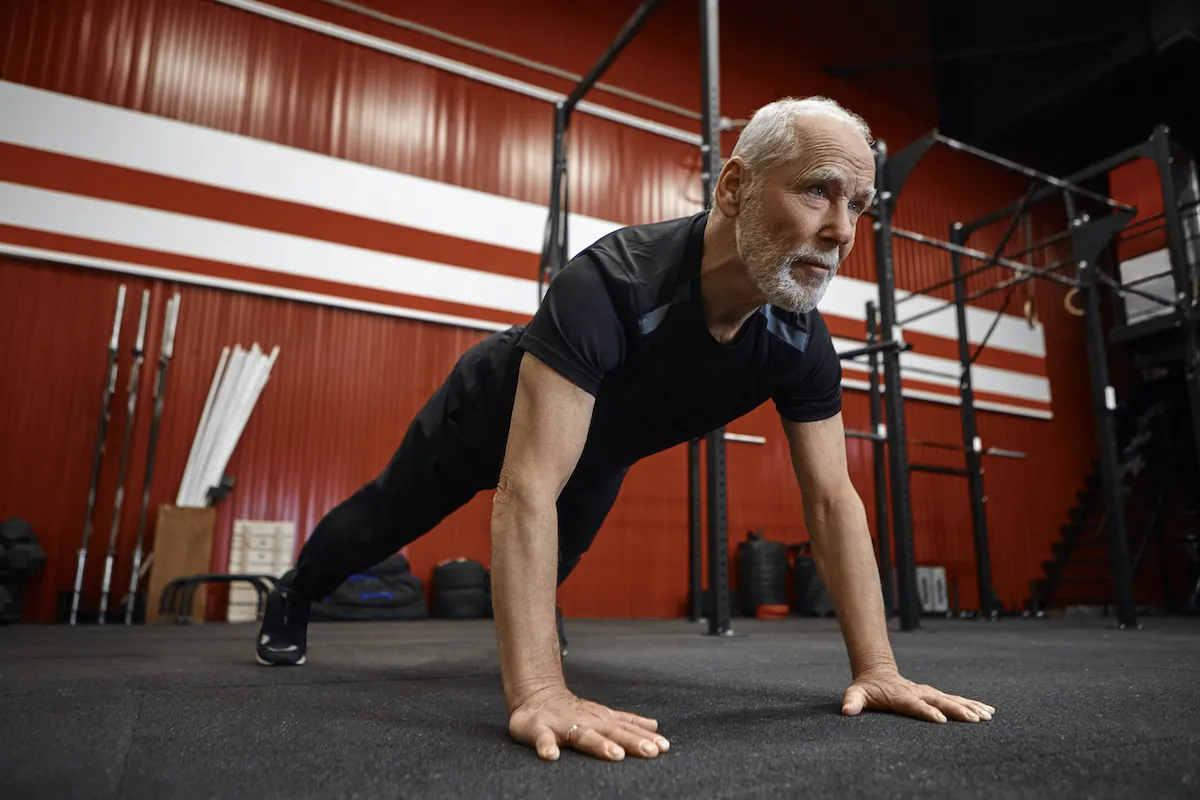New Study Reveals a Major Side Effect of Exercising in Your 60s

Atrial fibrillation, or AFib, is a persistent heart disorder characterized by an irregular and quickened heartbeat. The extent and duration of an AFib episode varies greatly from person to person, but generally symptoms include dizziness, heart palpitations, shortness of breath, and fatigue. Suffice to say, if left unchecked, AFib is a condition that can do worse than simply impede your quality of life. Beyond those short-term symptoms, AFib is also associated with a much higher risk of suffering a heart attack, stroke, or heart failure.
Unfortunately, AFib is actually quite common—and appears to be becoming even more ubiquitous moving forward. This study published in the scientific journal Circulation estimates there are over 30 million people on a global scale living with AFib. Meanwhile, other research published in the British Medical Journal concludes adults over the age of 55 may have a one in three chance of developing AFib.
While exercise is often recommended in conjunction with more traditional AFib treatments, such as surgery or medication, the sole effect of consistent exercise on AFib occurrence and symptom severity has largely remained a medical gray area—until now. Groundbreaking new research set to be presented at the European Society of Cardiology's 2021 Congress has uncovered much more on the relationship between exercise and AFib, particularly among older adults. Read on to learn about a huge side effect of exercising in your 60s. And for some specific exercises you may wish to avoid, don't miss this list of The Worst Exercises You Can Do After 60.
A Full Year's Study

This new study was no quick affair. After tracking a group of older adults (average age 65, 43% female) for a full year, researchers report a steady and consistent aerobic exercise regimen can help promote and maintain a regular heart rhythm and reduce symptom severity when AFib does occur.
"The ACTIVE-AF trial demonstrates that some patients can control their arrhythmia through physical activity, without the need for complex interventions such as ablation or medications to keep their heart in normal rhythm," says study author Dr. Adrian Elliott of the University of Adelaide in Australia.
To be clear, one or two sessions on the treadmill probably won't do the trick. Study participants engaged in a dedicated exercise program for six straight months to enjoy these benefits. And for more great exercise advice, don't miss The Secret Mental Trick for Getting a Lean Body, Say Experts.
It's All About Cardio

This isn't the first study to indicate exercise can help with AFib, but it's certainly the most extensive. This observational study published in the Journal of the American College of Cardiology found that AFib patients who upped their cardio game over the course of a five year period were less likely to have recurrent AFib episodes. Another small research project published in Circulation reported that just 12 weeks of aerobic exercise was enough to shorten the length of AFib attacks.
3.5 Hours of Exercise a Week

This latest study set out to assess the impact of a six-month exercise program on AFib recurrence and symptom severity, both during those first six months as well as after another six months of follow-up time. Individuals living with both short AFib episodes (paroxysmal AFib) and longer episodes (persistent AFib) that require an intervention of some kind (medication, etc) were included in this work, but not patients whose heartbeats can't be returned to normal (termed permanent AFib).
A total of 120 older adults took part in the study. To start, half were randomly assigned to the exercise group while the other half was simply instructed to continue with their usual lifestyles.
Adults assigned to the exercise cohort attended supervised exercise sessions to go along with an individualized home training regimen. For the first three months subjects attended exercise courses on a weekly basis, while the next three months mandated exercise courses on a bi-weekly basis. Generally, researchers were hoping to see each person assigned to the exercise group work out for at least three and a half hours per week. The training sessions were usually high-intensity, while home workouts were more up to the individual and could be accomplished by going for a walk, bike ride, swimming, etc.
Importantly, all 120 study participants continued to receive their usual cardiological care from their physician of choice.
One Year Later

By the time a full 12 months had passed, individuals assigned to the exercise group showed a significantly lower AFib recurrence rate (60%) than the other participants (80%). "Recurrent AFib" was defined as any episode lasting longer than 30 seconds, undergoing an ablation procedure, or needing ongoing antiarrhythmic drug therapy.
"Patients in the exercise group also had a significant reduction in the severity of their symptoms at 12 months compared to the control group. "This means that patients reported less severe palpitations, shortness of breath and fatigue," Dr. Elliott explains.
"Our study provides evidence that aerobic exercise should be incorporated into the treatment of patients with symptomatic AF. This should sit alongside the use of medications, as guided by a cardiologist, and management of obesity, hypertension and sleep apnea. As a general guide, patients should strive to build up to 3.5 hours per week of aerobic exercise and incorporate some higher intensity activities to improve cardiorespiratory fitness," he concludes. And if walking is your favorite form of exercise, don't miss The Secret Cult Walking Shoe That Walkers Everywhere Are Totally Obsessed With.








